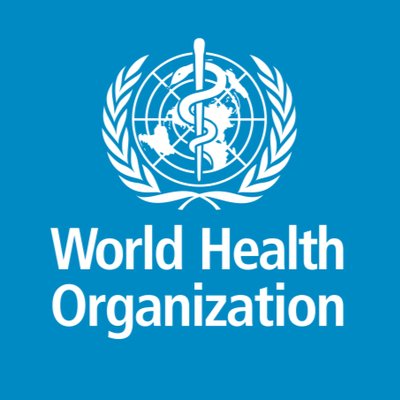
|
@WHO | |||||
|
New WHO estimates: In areas affected by conflict 1 person in 5 is living with some form of mental disorder, from mild #depression or anxiety to psychosis. bit.ly/31qtqMH #LetsTalk pic.twitter.com/cS4JUDF3JT
|
||||||
|
||||||

|
World Health Organization (WHO)
@WHO
|
Jun 12 |
|
Among people who have experienced war or other conflict in the previous 10 years, almost 1 in 10 will have a moderate or severe mental disorder. bit.ly/31qtqMH #LetsTalk pic.twitter.com/J4yB1IOL3y
|
||
|
|
||

|
World Health Organization (WHO)
@WHO
|
Jun 12 |
|
The percentage of people with #mentalhealth conditions in areas affected by conflict is more than double that of the general population. bit.ly/31qtqMH #LetsTalk pic.twitter.com/TIWgdyZVna
|
||
|
|
||

|
World Health Organization (WHO)
@WHO
|
Jun 12 |
|
A lack of access to treatment and care for people with a severe mental disorder in areas affected by conflict isn’t just about improving #MentalHealth, it’s a matter of survival. bit.ly/31qtqMH #LetsTalk pic.twitter.com/G2EebtQEAo
|
||
|
|
||

|
World Health Organization (WHO)
@WHO
|
Jun 12 |
|
People with severe mental disorders are especially vulnerable during emergencies and need access to #MentalHealth care and other basic needs bit.ly/31qtqMH #LetsTalk
|
||
|
|
||

|
World Health Organization (WHO)
@WHO
|
Jun 12 |
|
WHO has developed a range of tools to help establish & scale up psychosocial & #MentalHealth support in emergency settings, including the training for general #HealthWorkers to recognize and provide first-line support for common mental disorders. bit.ly/31sbVf0 pic.twitter.com/j1hZOvxEWL
|
||
|
|
||

|
World Health Organization (WHO)
@WHO
|
Jun 12 |
|
Psychological interventions for people impaired by prolonged distress should be offered by specialists or by trained and supervised community workers in the health and social sector. tp://bit.ly/31qtqMH #LetsTalk pic.twitter.com/gihsLYv8xr
|
||
|
|
||

|
World Health Organization (WHO)
@WHO
|
Jun 12 |
|
#MentalHealth services & psychosocial support in #Syria are becoming now more widely available than ever before the conflict. They are now offered in 30% of primary & secondary health & social care facilities, through community & womens’ centers & through school-based programmes. pic.twitter.com/Io7K7bi1lE
|
||
|
|
||

|
World Health Organization (WHO)
@WHO
|
Jun 12 |
|
In Lebanon, in recent years, 1 million refugees have crossed the border from Syria. The Government of Lebanon used is using the opportunity to scale-up #MentalHealth services, for the benefit of the new arrivals and the local population.
pic.twitter.com/uysrTZJcoZ
|
||
|
|
||

|
World Health Organization (WHO)
@WHO
|
Jun 13 |
|
#MentalHealth should also be a component of national disaster preparedness plans. WHO and @pahowho are supporting countries in the Caribbean sub-region to provide adequate mental health and psychosocial support to people in need following hurricanes and other natural disasters. pic.twitter.com/oEwOzmCzGw
|
||
|
|
||

|
World Health Organization (WHO)
@WHO
|
Jun 13 |
|
Investment in #MentalHealth services during after emergency situations not only helps people survive through extreme stress and hardship, but also supports a nation’s recovery. pic.twitter.com/Mc67mpQiGW
|
||
|
|
||

|
pravinchandra
@pravinchandra
|
Jun 12 |
|
May be it is the exact reason why conflict happened in first place...
|
||
|
|
||

|
Tina Dadic
@SunceMore1
|
Jun 12 |
|
Digital transformation is helpful if prepared to impfove utiliy of the human resources. #GlobalGoals
@WHO
|
||
|
|
||

|
Bees Wax
@BeesWax2017
|
Jun 12 |
|
All the more reason NOT to take in refugees when we don’t have the services to handle their problems.
|
||
|
|
||

|
Jaweria Islam Khan.B 🇵🇰
@J_MaxFacSurgeon
|
Jun 12 |
|
I would say the ratio is up high to 3:5 !!
|
||
|
|
||

|
AYESHA
@Ayesha_Ayesha__
|
Jun 12 |
|
May Allah bless them
|
||
|
|
||

|
jade
@jade30180856
|
Jun 12 |
|
amazing 😍
|
||
|
|
||

|
Apă Chioară
@CianGaia
|
Jun 12 |
|
👁️
😟😟
👥👥👥
Compasiune.
. pic.twitter.com/Kd8YLczc0k
|
||
|
|
||

|
mary
@msParks201
|
Jun 12 |
|
Only one in 5?
|
||
|
|
||

|
Gianluca De Michele
@giandemi62
|
Jun 12 |
|
If I don’t fail to remember, there’s same madical literature for Londoners following V1 and V2 Nazi WWII missile bombing...
|
||
|
|
||

|
Humanitarian News Daily
@humanewsdaily
|
Jun 12 |
|
Education about mental illness is absolutely needed for every step of the humanitarian process
|
||
|
|
||
